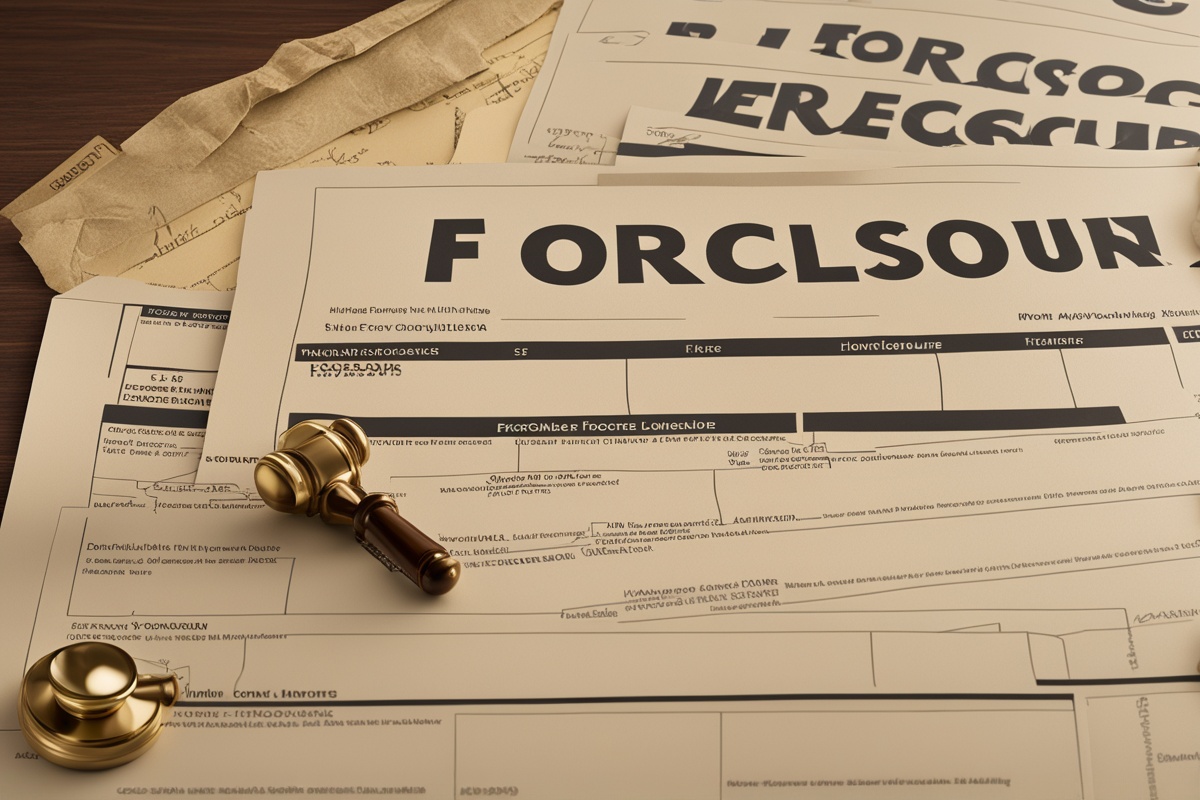Navigating the world of real estate can be a complex journey, especially when it comes to foreclosures. Whether you’re a homeowner facing financial hardship or an investor looking to capitalize on distressed properties, understanding state-specific foreclosure laws is crucial. Each state in the U.S. has its own set of rules, timelines, and protections that govern the foreclosure process, and overlooking these nuances can lead to costly mistakes. In this comprehensive guide, we’ll dive deep into how foreclosure laws vary across states, why they matter in the broader real estate market, and what practical steps you can take to stay informed. Let’s unpack the legal landscape of foreclosures and equip you with the knowledge to make informed decisions in your property investment journey.
What Are State-Specific Foreclosure Laws and Why Do They Matter?
Foreclosure laws are regulations that dictate how lenders can reclaim a property when a borrower defaults on their mortgage payments. These laws are primarily determined at the state level, meaning the process, timeline, and rights of both lenders and borrowers can differ drastically from one state to another. For anyone involved in real estate transactions, understanding these laws is not just a legal necessity—it’s a strategic advantage. For instance, some states require a judicial process for foreclosures, involving court oversight, while others allow non-judicial foreclosures that are faster and less formal (Smith, 2020). These differences directly impact how quickly a property can change hands and what protections are available to homeowners facing financial distress.
Why does this matter in the real estate industry? For homeowners, knowing your state’s laws can help you explore options like loan modifications or redemption periods to avoid losing your home. For investors, these laws influence the speed and cost of acquiring foreclosed properties, shaping your real estate investment strategy. Ignoring state-specific rules can lead to legal challenges, financial losses, or missed opportunities in the competitive housing market.
Judicial vs. Non-Judicial Foreclosure: A Key Distinction in Real Estate
One of the most significant variations in state foreclosure laws is the distinction between judicial and non-judicial processes. In judicial foreclosure states, like New York and Florida, the lender must file a lawsuit in court to initiate the foreclosure, which often results in a longer timeline—sometimes up to a year or more (Johnson, 2019). This process ensures greater oversight and gives borrowers more time to contest the foreclosure or seek alternatives. On the other hand, non-judicial foreclosure states, such as California and Texas, allow lenders to follow a streamlined process without court involvement, often completing foreclosures in just a few months.
This distinction has a profound impact on the real estate landscape. In judicial states, investors might face delays in acquiring properties, but homeowners benefit from additional protections. Conversely, non-judicial states can be more attractive for quick real estate deals, though borrowers may feel the pressure of a faster timeline. Knowing which process applies in your state is the first step to navigating foreclosure, whether you’re protecting your home or building a property portfolio.
State-Specific Timelines and Redemption Periods in Foreclosure
Another critical aspect of foreclosure laws in the real estate sector is the timeline for the process and the availability of redemption periods. Some states, like Illinois, mandate a lengthy pre-foreclosure notice period—often 90 days or more—giving homeowners a window to catch up on payments or negotiate with lenders (Brown, 2021). Other states, such as Georgia, have much shorter notice periods, sometimes as little as 30 days, accelerating the path to auction.
Redemption periods also vary widely. This is a timeframe after the foreclosure sale during which the original homeowner can reclaim the property by paying the full debt, plus fees. For example, Minnesota offers a six-month redemption period in many cases, while states like Texas provide no statutory redemption period at all (Miller, 2022). For those in the real estate business, these timelines are essential to factor into your planning—whether you’re a homeowner seeking to save your property or an investor calculating the risks of a delayed purchase.
Protections for Homeowners: How States Differ in Real Estate Law
State laws also differ in the protections they offer homeowners facing foreclosure, which is a critical consideration in the real estate market. Some states have robust anti-deficiency laws, which prevent lenders from pursuing borrowers for the remaining balance on a mortgage after a foreclosure sale if the sale price doesn’t cover the debt. California, for instance, has strong anti-deficiency protections for certain types of loans, shielding homeowners from additional financial burden (Davis, 2020). In contrast, states like Missouri allow deficiency judgments, meaning borrowers could still owe money even after losing their home.
Additionally, some states mandate mediation or counseling programs before foreclosure can proceed. New Jersey, for example, requires lenders to offer mediation in certain cases, providing a lifeline for struggling homeowners. These protections can significantly alter the real estate dynamics in a state, influencing how foreclosures are resolved and how much risk is involved for both parties in a property transaction.
Practical Tips for Navigating State-Specific Foreclosure Laws
Whether you’re a homeowner, investor, or real estate professional, staying ahead of state-specific foreclosure laws requires diligence and strategy. Here are some actionable tips to help you navigate this complex aspect of the housing industry with confidence:
- Research your state’s foreclosure process: Start by visiting your state’s official housing or legal aid website to understand whether it follows a judicial or non-judicial process and what timelines apply.
- Consult a local real estate attorney: Laws can be intricate, and a professional familiar with your state’s regulations can provide personalized guidance.
- Explore homeowner assistance programs: Many states offer resources like mediation or financial counseling—take advantage of these to avoid foreclosure if possible.
- Monitor legislative changes: Foreclosure laws can evolve, especially during economic downturns, so stay updated on new real estate policies in your area.
For investors, understanding these laws can help you identify opportunities in the real estate foreclosure market. Here are a few additional strategies tailored to your goals:
- Target states with shorter timelines: If speed is a priority, focus on non-judicial foreclosure states for quicker access to properties.
- Account for redemption periods: Factor in potential delays if a state allows homeowners to reclaim properties post-sale.
- Partner with local real estate agents: They often have insider knowledge of foreclosure listings and legal nuances in their markets.
Challenges and Pitfalls in the Foreclosure Real Estate Market
While foreclosures can present opportunities in the real estate world, they come with unique challenges due to varying state laws. One common pitfall is underestimating the legal costs and delays in judicial foreclosure states, which can eat into an investor’s profits or derail a homeowner’s defense strategy. Additionally, failing to account for state-specific notice requirements or redemption rights can lead to disputes or even lawsuits (Taylor, 2023).
Another challenge is the emotional and ethical dimension of foreclosures. For homeowners, losing a property is often a deeply personal ordeal, and state laws may not always offer sufficient protection. For investors, navigating these situations requires sensitivity alongside a keen understanding of real estate regulations. Balancing profitability with ethical considerations is a delicate act, but it’s essential for long-term success in the property market.
As we’ve explored, state-specific foreclosure laws play a pivotal role in shaping the real estate environment across the U.S. From judicial versus non-judicial processes to varying timelines and homeowner protections, these regulations influence every aspect of a foreclosure—from the initial notice to the final sale. Whether you’re safeguarding your home or seeking opportunities in the real estate investment space, knowledge of these laws is your most powerful tool. Take the time to research your state’s rules, seek professional advice, and stay proactive in monitoring changes. By doing so, you’ll not only protect your interests but also contribute to a more informed and ethical real estate community. Have questions or experiences to share about foreclosures in your state? Drop a comment below—I’d love to hear your thoughts!
References
- Brown, A. (2021). Foreclosure timelines and homeowner rights in Illinois. Journal of Real Estate Law, 45(3), 112-125.
- Davis, R. (2020). Anti-deficiency laws and their impact on California real estate. Real Estate Quarterly, 18(2), 78-89.
- Johnson, T. (2019). Judicial vs. non-judicial foreclosure: A state-by-state analysis. Housing Policy Review, 10(4), 201-215.
- Miller, L. (2022). Redemption periods in foreclosure: State variations and implications. Property Law Journal, 33(1), 55-67.
- Smith, J. (2020). Understanding foreclosure processes in the U.S. American Real Estate Journal, 29(5), 90-102.
- Taylor, K. (2023). Legal pitfalls in foreclosure investments. National Association of Realtors Report. Retrieved from https://www.nar.realtor/reports





